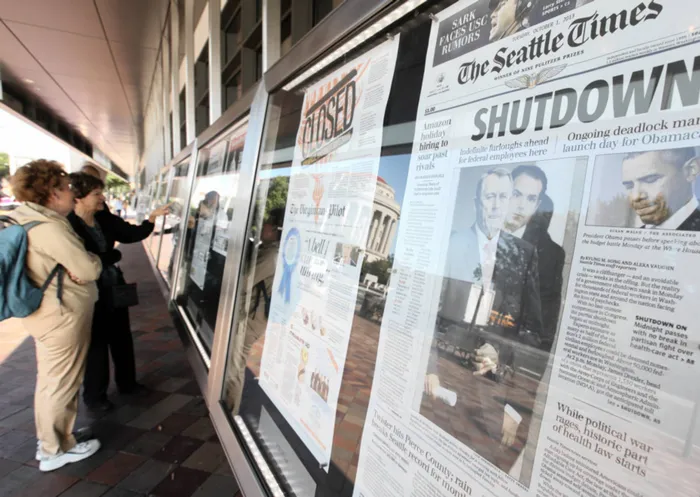Obama cuts trips to deal with shutdown

Tourists looks at newspaper front pages at the Newseum in Washington D.C., U.S., on Tuesday, Oct. 1, 2013. The U.S. government began its first partial shutdown in 17 years, idling as many as 800,000 federal employees, closing national parks and halting some services after Congress failed to break a partisan deadlock by a midnight deadline. Photographer: Julia Schmalz/Bloomberg *** Local Caption *** Tourists looks at newspaper front pages at the Newseum in Washington D.C., U.S., on Tuesday, Oct. 1, 2013. The U.S. government began its first partial shutdown in 17 years, idling as many as 800,000 federal employees, closing national parks and halting some services after Congress failed to break a partisan deadlock by a midnight deadline. Photographer: Julia Schmalz/Bloomberg *** Local Caption ***
Mark Felsenthal Washington
US President Barack Obama scrapped part of a long-planned trip to Asia yesterday and left the remainder of the visit in doubt as the US government shutdown entered its second day with no end in sight to the funding battle in Congress that triggered it.
Obama scuttled two stops on the four-country tour and left visits to two other countries up in the air, according to White House statements.
The president told his counterparts in Malaysia and the Philippines he would not be able to meet them and a White House official said the president was weighing whether to attend diplomatic summits in Indonesia and Brunei.
“We will continue to evaluate those trips based on how events develop throughout the course of the week,” National Security Council spokeswoman Caitlin Hayden said.
Obama had been due to start a week-long trip on Saturday.
Not only must the president deal with the budget impasse and its effects, but he faces an even bigger crunch in Congress, which will put the US at risk of defaulting on its debts if it does not raise the public debt ceiling.
Treasury Secretary Jack Lew has said the US would exhaust its borrowing authority no later than October 17.
The fight between Obama’s Democrats and the Republicans over the government’s borrowing power is rapidly merging with the stand-off over everyday funding, which has forced the first government shutdown in 17 years and forced hundreds of thousands of federal employees to take unpaid leave.
The announcements about the Asia trip followed a fruitless day on Capitol Hill, with congressional Democrats and Republicans coming no closer to resolving their differences.
Obama accused Republicans of taking the government hostage to sabotage his health-care law, the most ambitious social programme in five decades, passed three years ago.
Republicans who control the House of Representatives view the Affordable Care Act as a dangerous extension of government power, and have coupled their efforts to undermine it with efforts to block government funding. The Democratic-controlled Senate has repeatedly rejected those efforts.
The stand-off has raised new concerns about Congress’s ability to perform its most basic duties and threatens to hamper a still fragile economic recovery.
“This is a mess. A royal screw-up,” said Democratic Representative Louise Slaughter of New York.
As police cordoned off landmarks such as the Lincoln Memorial, and government agencies stopped functions ranging from cancer treatments to trade negotiations, Republicans in the House sought to restore funding to national parks, veterans’ care and the District of Columbia, the capital.
An effort to pass the three bills fell short on Tuesday evening, but Republicans plan to try again. They are likely to be defeated by the Democratic-controlled Senate.
“They’ve
shut down the government over an ideological crusade to deny affordable health insurance to millions of Americans,” Obama said on Tuesday.
Republicans said he could not complain about the impact of the shutdown while refusing to negotiate. “The White House position is unsustainably hypocritical,” said Michael Steel, a spokesman for House Speaker John Boehner.
The last shutdown in 1995 and 1996 cost taxpayers $1.4 billion (R14bn), according to congressional researchers. A 2011 stand-off over the debt ceiling hammered consumer confidence and prompted a first-ever downgrade of the US’s credit rating. Analysts say this time it could be worse.
A Reuters/Ipsos poll indicated that 24 percent of Americans blamed the Republicans, while 19 percent blamed Obama or the Democrats. Another 46 percent said everyone was to blame. – Reuters